Kill Bill Volume 2
 for violence, language and brief drug use.
for violence, language and brief drug use.
Reviewed by: Chris Monroe
STAFF WRITER
| Moral Rating: | Offensive |
| Moviemaking Quality: |
|
| Primary Audience: | Adults |
| Genre: | Martial-Arts Action Crime Thriller Sequel |
| Length: | 1 hr. 34 min. |
| Year of Release: | 2004 |
| USA Release: |
April 16, 2004 |
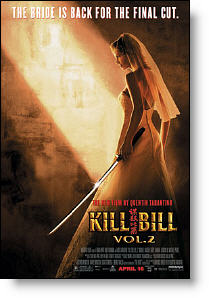
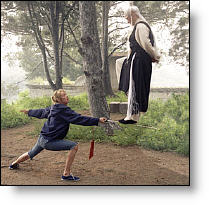
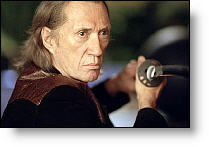
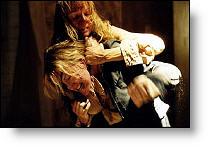
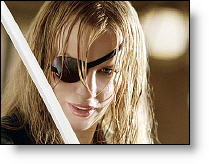
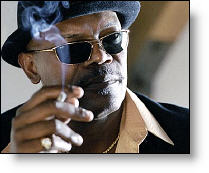

| Featuring |
|---|
|
Uma Thurman David Carradine Daryl Hannah Michael Madsen Sonny Chiba |
| Director |
| Quentin Tarantino — “Kill Bill Vol. 1,” “Jackie Brown,” “Pulp Fiction,” “Reservoir Dogs” |
| Producer |
|
Quentin Tarantino Lawrence Bender E. Bennett Walsh |
| Distributor |
Here’s what the distributor says about their film: “After dispensing with former colleagues O-Ren Ishii and Vernita Green in KILL BILL VOL. 1, the Bride (Thurman) resumes her quest for justice in the series’ second installment, KILL BILL VOL. 2. With those two down, the Bride has two remaining foes on her “Death List” to pursue—Budd (Michael Madsen) and Elle Driver (Daryl Hannah)—before moving on to her ultimate goal… to kill Bill (David Carradine).”
Prequel: “Kill Bill Vol. 1” (2003)
Explicitly headlined as the fourth film by Quentin Tarantino, this second volume of the one story “Kill Bill,” begins with chapter six, is four times less violent than the first movie, and is three times the love story one might expect. Both words of the title could easily be used to describe the content of each film. Volume one focuses on “killing” and the second, while keeping Kiddo (Uma Thurman) as the protagonist, focuses on Bill.
Having only a voice over in the first movie, Bill (David Carradine) makes his first appearance in Volume Two during the flashback of the wedding rehearsal where the initial assassination occurred. The fact that Kiddo is pregnant with Bill’s child (and the fact that the child is alive) has only been briefly mentioned up until now. But as Bill and Kiddo literally go toe-to-toe, their past and present relationship energizes this narrative from beginning to end. With the help of flashbacks, we find out about Kiddo’s four year hiatus in the hospital, her training with a Kung Fu master (Gordon Liu), and the romance she and Bill once had—all of which are interspersed throughout her mission to find and kill Bill.
Braced for another show of violence, it was surprising to see so many scenes involving only dialogue. Furthermore, a lot of the action that does exist was centered on Kiddo’s struggle and determination to accomplish her goal. They refrain from the gratuitous chopping off of heads and limbs and spraying blood, and deal more with Kiddo’s personal, physical struggles. Her obstacles include recovering from four years of bed rest, enduring arduous training in martial arts, being shot with salt pellets, trekking through the desert and being buried alive.
However, there are several incidents of violence, one of which is quite graphic. There is gun shooting and sword fighting, and aside from the fight where somebody’s eye is plucked out and squashed, the rest of the violent episodes are rather run of the mill, or only alluded to. One example is how the camera pulls back and only the sound of gunshots is heard inside the wedding chapel.
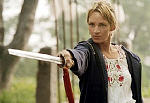
Consistent with his other films, Tarantino does avoid showing any nudity or sex scenes. Expectantly, there is a fair amount of foul language, though. And one scene depicts two people—with one woman wearing a revealing top—doing drugs. These characters, however, are not appealing in any fashion as people anyone would want to emulate.
In Volume One, Kiddo boasts to the first person she kills as being someone with no compassion, mercy or forgiveness. At that time, Kiddo thought she had lost everything. But sticking to her plot for revenge, she is eventually surprised to find some of these traits rising to the surface. Guess you could call it her “motherly instincts.” Though the story never veers away from it’s motive for revenge, it was a little affecting to see this “Terminator”-esque female lead tap into sensitive facets of her feminine nature. I was taken aback to find myself moved by these qualities that she expresses.
This film is obviously made for pure entertainment, with its references to old Kung Fu movies, Japanese gangster films and spaghetti westerns—and not really made to offer some kind of uplifting moral lesson. It is noteworthy how sensitive this second film gets, but it is primarily for the craft of good storytelling. Entertainment is the drive, and it lies with elaborate elements such as the “five-point-palm-exploding-heart technique.”
Violence: Heavy to extreme / Profanity: Moderate / Sex/Nudity: Minor


Of course, we should still be concerned about people overdoing it, children seeing it who cannot cope with what they are seeing, etc. however from my personal experience… non Christians respond better when you tell them that you have read books like Harry Potter or you have see movies like Kill Bill and you can discuss both the good and the bad things about them in a calm and rational manner. It is a true challenge to become that kind of Christian but if that is what is being asked of us… follow Christ’s lead.See all »
[Average/5]
Otherwise, I was shocked at how little violence there was. Tarantino is a master of drama! The script and sets were good enough that it kept my interest without action—although don’t get the wrong impression, there definitely was some exciting suspense and action! There is a lot to commend about this film. I can’t really go into them without writing spoilers, but The Bride’s desire to redeem her life led to solid Biblical choices, even though it was hard, whereas most people would have taken a sinful way out.
The eye scene and some occasional F-bombs are my reservations about recommending this film. But if you can handle those things, I don’t think you’ll be disappointed! I’m glad my friends brought this film to my attention!
Note: After my mostly positive comment on “Kill Bill Vol. 2” (above), someone suggested that I explain my reason for refusing to watch Vol. 1. And it’s actually pretty simple. This movie is like the “Saw” franchise in that there are no conflicting reports about the violence. All reviews, both positive and negative, Christian and non, agree that this is a gratuitously bloody film that is not for children, and not even for adults who are faint of heart. But, from time to time, I myself have seen movie discussion videos and stuff that showed clips from the infamous Crazy 88 fight scene.
This made it all the more clear to me that the movie was TRYING to be gratuitous, for fun. Like the “Saw” franchise, except it’s action, not horror. My most recent review was “London Has Fallen,” which, after the language, my main beef with it was that a few scenes showed more than necessary. But even in those scenes, the violence was no gorier than it would be in real life; it just wasn’t necessary to show the scenes at all. But the violence in “Kill Bill” is unearthly and impossibly gruesome. Okay, so I’ve never actually seen someone get a limb cut off, but when you cut yourself, does a little stream of blood spray out like a hose? That’s never happened to me.
Moral rating: Offensive / Moviemaking quality: 5
[Average/3]
The animated scene did it for us. My husband who tolerates violence better than I can pulled the plug on this one. I probably would have done it sooner had I not been covering my eyes with my hands. The overall swearing and taking God’s name in vain, and the gore of this movie does not showcase Tarintino’s talent and gifts as a writer. These gifts and talents were alotted to him by our God, by the way, whether he realizes it or not, and when I see a movie like this I think to myself about the writers, the actors, the people who did all the technical stuff, and that artist who did the animation, WHAT A WASTE!!
Although I don’t believe I have shallow taste in movies, I really hate to watch human nature at its worst, and the bride’s thirst for revenge and then murdering that poor little girl’s mother before her very eyes was really anti-Christ, no matter the motive.
[Extremely Offensive/4]
[Average/1½]
[Average/5]
[Excellent!/5]

I’m still not convinced about what constitutes using Christ’s name in vain, and thus wasn’t particularly offended by the various utterances of “Christ,” “Jesus,” and “God” as exclamations for emphasis, though I was offended by the arrogance exhibited in a scene where a legendary Japanese blacksmith claims that one of his swords could cut God himself, at least any more so than the human physical frailties Christ adopted under his Incarnation rendered him vulnerable to the scourgings and nailings that he suffered and from which he bled profusely enough to cover all of our sins.See all »
My Ratings: [Average/5]